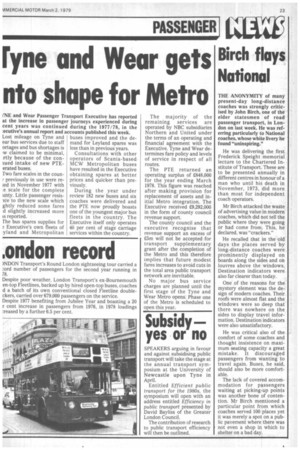Birch flays National
Page 25

If you've noticed an error in this article please click here to report it so we can fix it.
THE ANONYMITY of many present-day long-distance coaches was strongly criticised by John Birch, one of the elder statesmen of road passenger transport, in London on last week. He was referring particularly to National coaches, whose white livery he found "uninspiring."
He was delivering the first Frederick Speight memorial lecture to the Chartered Institute of Transport. These are to be presented annually in different centres in honour of a man who until his death in November, 1973, did more than most for independent coach operators.
Mr Birch attacked the waste of advertising value in modern coaches, which did not tell the public where they were going or had come from. This, he declared, was "crackers."
He recalled that in the old days the places served by long-distance coaches were prominently displayed on boards along the sides and on louvres above the windows. Destination indicators were also far clearer than today.
One of the reasons for the mystery element was the design of modern coaches. Their roofs were almost flat and the windows were so deep that there was nowhere on the sides to display travel information. Destination indicators were also unsatisfactory.
He was critical also of the comfort of some coaches and thought insistence on maximum seating capacity a great mistake. It discouraged passengers from wanting to travel again. Buses, he said, should also be more comfortable.
The lack of covered accommodation for passengers waiting at picking-up points was another bone of contention. Mr Birch mentioned a particular point from which coaches served 100 places yet it was merely a spot on a public pavement where there was not even a shop in which to shelter on a bad day.












































































































